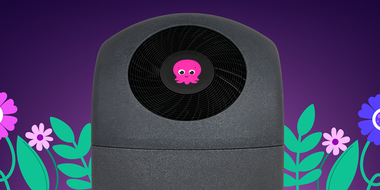Brave the cold weather with a Cosy heat pump
Do heat pumps work in cold weather?
When the temperature plummets (along with our motivation to venture outside), most of us just want to be tucked up on the sofa – cup of tea in hand, telly on, and a bottomless supply of biscuits nearby. Thankfully, unlike us, heat pumps are perfectly happy in the cold.
Contrary to myth, modern heat pumps can still extract heat from the air and work brilliantly in temperatures as low as -20°C. And while it’s rare for the UK to dip that low, it’s reassuring to know your new heating system won’t get frostbite.
Don’t believe us? We’re glad in a way. Because, in a moment of madness, our Social Media Manager decided to jump into a freezing chamber to prove it to you. And he’s really hoping this video wasn’t a total waste of time.

The heat pump experiment
Meet Xander, our Social Media Manager turned mad scientist. His mission? To test the limits of our Cosy heat pump by stepping into a freezing chamber alongside it. He even bet his moustache on how long he could last. Bundled in more layers than an onion (and armed with questionable optimism), he’s now officially the human benchmark for cold-weather comfort. Don’t try this at home kids …
A few takeaways
❄️ Our heat pump extracts heat even from freezing air
❄️ Cosy consistently maintains a warm environment
❄️ It gives any gas boiler a run for its money in extreme conditions - it’s cheaper to run too!

Now for a bit of smart tech science
We cornered TJ, one of our renewable heating experts, to pick his brain on all things heat pumps – from how they work and how efficient they are, to how they handle the cold (and what those mysterious defrost cycles actually do).
How does a heat pump work in winter?
How do air source heat pumps like Cosy keep your home warm in winter?
TJ: Heat pumps work the same way a refrigerator does. Most of us think of our refrigerators as something that makes things cold, which is the ultimate result of their work. But a refrigerator is actually just a heat pump–one that extracts the heat from the air inside and pumps it out into our homes (that’s why the back of your refrigerator is warm).
Air-source heat pumps for your home do the same thing. They extract heat from the air outside and pump it inside through your radiators. The key is the refrigerant: a special chemical that can boil even at very low temperatures. That means even when it feels cold outside to you and me, (say -20°C) the air temperature is still hot enough to boil the refrigerant in your heat pump.
That boiling action soaks up a bunch of heat energy. Then through the magic of valves and a compressor, the refrigerant temperature soars up to 65°C and gives up its heat to your radiator water. Then the cycle repeats. It’s not magic, but at times it seems pretty close!
What about the heat pump efficiency in cold weather?
Does the cop of a heat pump decrease as the weather gets colder, and the heat pump has to work harder?
TJ: True. The reason is because of that compressor I mentioned earlier. It has to work harder to cool the refrigerant below that outdoor temperature and then to compress it back to a much higher temperature. So the COP drops. But it’s worth nothing that the COP is still 2-3 times higher than a gas boiler in the same conditions. And COP is also an instantaneous measure. What matters is your SCOP–your seasonal COP–which reflects your heat pump’s awesome efficiency over the whole year.
🧠 Did you know ...
Scandinavia is one of the coldest regions in Europe, yet Norway, Sweden, and Finland have some of the highest adoption rates of air source heat pumps. If they’re trusted in -20°C winters, you can be confident they’ll work here in the UK.
PRO TIP: If you're curious about smart tech like Cosy, here's a link to more air source heat pump science.
What about built-in winter features?What's the deal with the defrost cycle?
TJ: Great question. Why does a heat pump need to defrost? Sounds odd. Recall the part about boiling the refrigerant even when the air is cold. As the outside air approaches 0°C, the refrigerant entering the evaporator (that big metal-finned radiator at the back) will be below the freezing point of water. That’s because it needs to pick up all that heat from the outside air that’s just above freezing and boil off. Since the refrigerant is below 0°C, so is the surface of the evaporator. That means little water droplets will start to freeze on the surface. Fortunately, heat pumps solve this problem easily by occasionally stopping the heating cycle for about 5 minutes and running in reverse, using hot refrigerant to melt the ice on the evaporator (it makes a satisfying hiss and steams a bit). Then it’s back to heating the home, or making hot water.
How do you keep the water in the heat pump from freezing if it’s not running?
TJ: Our Cosy has built-in frost protection. When the outside temperature falls below 7°C, our heat pump will periodically run its circulating pump to cycle a bit of warmer water from the home through the internal pipework. This only happens if your heat pump is in standby or off. If your heat pump is producing heat for your home, this protection feature doesn’t come into play. However, if it’s cold enough to risk your heat pump freezing you should definitely have your heating set to a safe temperature (we recommend 15°C minimum) to ensure nothing in your home freezes or is otherwise damaged.
🧠 Did you know ...
Even in colder months, air source heat pumps remain more efficient than traditional boilers. With efficiencies ranging from 200% to 400%, they produce two to four times more heat than the electricity they use.
PRO TIP: Check out how you can get the best out of a heat pump during the winter months.
Can an air source heat pump keep my whole home warm?
TJ: Yes, when sized and installed correctly, an air source heat pump provides steady, reliable heating for your entire home, even in the coldest UK weather. The key is to remember that your heat pump is just one component of the total heating system. Heating your home effectively requires properly sized radiators that can put enough heat into your home to overcome the heat loss in each room. Underfloor heating is especially effective in this respect because there’s so much radiative surface area. The simple answer is yes, but the better question is whether your home’s heating system is designed to.
What impact does cold weather have on a heat pump running costs?
TJ: Just like a boiler, heating your home will cost more when the weather is very cold. Your heat pump will work harder to make hotter water at a higher total output and run for longer to compensate for your home’s increased heat losses when the air is particularly frosty.

Cosy comfort, even on Britain’s frostiest days
Safe to say our Cosy heat pump is ready for whatever the UK weather throws at it! The best bit? It’s packed with smart features – updating regularly just like your phone, and when paired with the right tariff, it can save you up to £370 a year compared to a gas boiler!



Published on 29th September 2025 by:
Hey I'm Constantine, welcome to Octopus Energy!
×Close window

